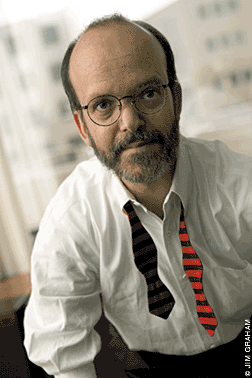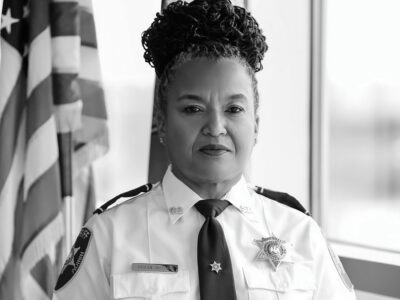
As he heads West for a teaching position in the other Washington, Paul Steven Miller C’83 looks back on a decade defending the rights of people with disabilities as an EEOC Commissioner—and a lifetime battling for his own.
By Lewis I. Rice | Photography by Jim Graham
During his summers as a student at Penn, Paul Steven Miller C’83 interned in the U.S. attorney’s office in New York. One of his bosses always wore a bow tie, a distinctive sartorial touch that grabbed the attention of the young aspiring attorney. Miller was inspired to make it his own signature style, so that whoever saw him for the first time would immediately think: There’s the lawyer with the bow tie.
Well, maybe not.
“I thought that, as I was starting a legal career, I needed something that set me apart from everybody else,” Miller says. “As if I didn’t have anything else.”
He certainly does now. He has a Penn undergraduate and Harvard Law pedigree, experience working in the White House, and 10 years of service on the U.S. Equal Employment Opportunity Commission (EEOC). Miller was also born with achondroplasia, a genetic condition that results in dwarfism, which sets him apart and is an ever-present part of him—but does not define him or his accomplishments, say those who know him.
“When I deal with Paul as a friend and colleague and a co-Penn alum, I would never say that his being a little person fades from my consciousness just because it’s so much a part of who he is and his identity in the world,” says classmate Elizabeth Cooper C’83, an associate professor at Fordham University School of Law in New York. “If I eliminated that knowledge of Paul, I would eliminate a big part of who he is. That having been said, if anyone looks at him solely as a little person, what a loss for them.”
In his career, Miller has fought against those who judge people on how they look or their gender, race, age, or nationality. After graduating from law school, he became director of litigation for the Western Law Center for Disability Rights, then deputy director of the U.S. Office of Consumer Affairs and White House liaison to the disability community. One of the longest serving commissioners in EEOC history, he left the agency on June 30 to join the faculty at the University of Washington School of Law.
As commissioner, Miller spearheaded efforts to resolve charges of discrimination through mediation, helping to improve the agency’s long-time backlog. A member of the Health and Human Services Secretary’s Advisory Committee on Genetics, Health and Society, he helped settle the EEOC’s first court action against genetic testing in the workplace. In addition to making decisions on litigation and policy with the other four commission members in Washington, he has traveled to every state in America and several countries on behalf of the EEOC, becoming the agency’s most visible spokesperson—and exemplar—in the battle against discrimination.
Before Miller began fighting that battle for others, he fought it for himself. When he was a student at Harvard Law School during the mid-1980s, representatives from 45 law firms, enticed by Miller’s credentials, arranged meetings with him during on-campus recruitment sessions. None offered him a callback. One of them even explained why during the interview itself: The firm of course didn’t have a problem with him, a representative said. But their clients would think they were running a circus freak show if they hired him as an attorney.
At that time, he had no federal recourse. But the passage of the Americans with Disabilities Act in 1990 has made such overt discrimination rarer and has changed the culture of the American workplace, Miller says.
“I think that the reality for students with disabilities, for professionals with disabilities, is dramatically different today than it was a scant 15, 18 years ago,” he says. “I think that’s attributable to the ADA, to an education process that employers have begun to journey down … It has made America stronger, because it forces employers to focus more on people’s qualifications than on stereotypes about that individual’s disability.”
The charges still stream into the EEOC, however—an average of 80,000 a year during Miller’s tenure. And the injustices still drive him, like the case of a restaurant employee fired by his regional manager. The employee, who has mental retardation, had done nothing wrong. But the regional manager didn’t want “those kinds of people” working in the restaurant. The employee eventually recovered substantial damages—an example, says Miller, of the need to pursue litigation to protect employees and send a message to “recalcitrant employers and bad actors.”
His advocacy on behalf of people with disabilities stands out in his tenure at the EEOC, says Leslie Silverman, a commissioner appointed two years ago. She calls Miller “a leader in the disability rights area. I think he’s completely accessible to all people with disabilities. He’s very cognizant of their interests, and he’s always looking out for them.”
Silverman says she has often consulted with Miller on disability cases before the commission. On occasion, he has talked her into voting to pursue a case. She is a Republican and he a Democrat, but party lines are less important to both of them, she says, than getting things done.
He has been confirmed three times as commissioner, including in the highly rancorous period after the impeachment of President Clinton, who initially appointed him to the EEOC. He has gained bipartisan support, Miller says, because he has worked with his Republican colleagues, has been principled but pragmatic, and has always explained his decisions. His proudest achievement of all, though, is that after 10 years in partisan Washington, everyone still thinks he’s a nice guy.
“One of the best things about him is he develops friends and colleagues, people who respect him and like him even if they have a difference of opinion on the ultimate matter,” Cooper says.
He will soon travel to a very different Washington to go back to school, this time to teach—as a very different person from the young man 25 years ago who didn’t even feel worthy to be taught at Penn.
When Miller was a high school student in Long Island, most of his friends planned to go to SUNY. He visited the Penn campus only after his best friend (who wanted to attend Wharton and become a millionaire businessman) urged him to join him in Philadelphia. The friend didn’t get in—but he still became a millionaire businessman. Miller did get into his school of choice, and he got exactly what he wanted, too. He just didn’t know it at the start.
“I was originally very intimidated by Penn and by the students there,” Miller says. “I felt like I’d never been in an environment where a lot of my classmates had gone to fancy schools and had a rigorous high-school education and I felt that everyone else was more qualified and prepared for Penn than I was.”
During his freshman year, he lived in Hill House, where he got to know some faculty members. He also took a freshman seminar with Dr. Vartan Gregorian Hon’88, the former Penn provost and dean, which introduced him to the intellectual challenges Penn provided and gave him confidence he could handle them. The University prepared him for the rigors to come, in law school and in his professional career, he says. “I think Penn gave me the confidence in myself,” he says. “I felt very lucky to go to Penn and very privileged to have a fancy, elite education. I felt a responsibility to do something with that tremendous experience.”
These days, Miller’s bow ties are chosen by his four-year-old daughter, Naomi. She usually picks the ones emblazoned with mermaids or bunny rabbits, not the kind usually seen at a U.S. attorney’s office or Harvard Law School.
Naomi does not have dwarfism. Neither does Miller’s wife, Jenni Mechem. She is hearing-impaired, he notes, so they share an understanding of living with a disability, albeit different kinds. If their child had been born with dwarfism, her parents wouldn’t have cared, he says. After all, he is a little person, and his wife married one.
Dwarfism is not just a disability based on size, though it certainly presents practical issues of navigating a world made for people at least a foot taller. Many people with dwarfism have respiratory or orthopedic problems and live with frequent pain, Miller included, though he doesn’t complain about it or even bring it up. Nor does he seem fazed by his recent, successful, bout with cancer, a disease that two years ago killed his younger brother Danny C’85 G’85. In fact, he sounds like a movie tough guy to anyone who is surprised about what he has overcome. “My physical problems are such that if I’m not dying, it’s fine,” he says.
If he could snap his fingers and make his dwarfism disappear, he would not do so, he says. A genetic mutation created his achondroplasia, but he does not think that gene is bad or something that needs to be cured. And most people with non-life-threatening disabilities would agree, he believes.
“People generally like who they are, and that it is a part of their identity,” says Miller. “And just because it is harder to be different doesn’t mean that you want to erase that difference or that identity. Just because it is harder to grow up and live in America being a person of color, doesn’t mean that all people of color walk around wishing they were white.
“I don’t wander around from the morning [when] I wake up to the time I go to sleep saying, ‘Oh, goddamn it, I’m so little, and this sucks.’ I just am who I am. Sometimes I have good days, sometimes I have bad days, and there are times in my life where I’ve embraced who I am, and times in my life when I haven’t embraced who I am, and that’s okay. But I don’t think that people should view folks with disabilities, whether you use a wheelchair, or you’re a dwarf, or you’re blind, or what have you, and say, ‘Oh, I bet you sit around hoping that you could get out of your wheelchair and walk again,’ because I don’t think that people with disabilities think that way.”
Sometimes, however, the very term disabled rankles people. Miller learned that when, as director of litigation for the Western Law Center for Disability Rights, he filed lawsuits on behalf of people with HIV and AIDS, claiming disability civil-rights violations. Some of his clients rejected the label, and were in fact deeply offended by it, he says. “There’s so much stigma attached to being disabled, that people who may suffer from discrimination are willing to say, ‘That’s somebody else, that’s not me,’” Miller says.
“As self-identifying as someone who is disabled, I recognize that disability occurs in many different ways,” he adds. “It’s not just people who use wheelchairs or who are blind and who are deaf. It’s a whole lot of other folks. We have to embrace and recognize the universality of that.”
With his help the stigma is dwindling, says Cary Egan of Philadelphia, former vice president of public relations for Little People of America. In 2002 she presented Miller with its annual Award for Promoting Awareness of Individuals with Dwarfism, for his work with the EEOC and his role in promoting awareness not only of people with dwarfism, but with other disabilities as well.
“He’s done a lot to improve the lives of millions of people with disabilities and also mentoring LPA in terms of having more of a disability identity,” says Egan. “He’s really putting dwarves on the map, so to speak.”
The problem of discrimination in the workplace differs for employers and employees, just as it differs in New York or Jackson, Mississippi, or Boise, Idaho, Miller says. So he speaks to people who have different perspectives in different places. It’s important for federal policymakers to break free of the Beltway, or the “echo chamber,” as he calls it, and listen to the views of the people whose lives they affect, he says.
“Paul Miller’s involvement has been to reach out to people all over the United States to encourage them to use the system,” says Charles Warner, a partner at Porter Wright Morris & Arthur in Columbus, Ohio, who represents employers in connection with discrimination charges. Warner, who served as management co-chair of the equal employment-opportunity committee of the American Bar Association from 2000 to 2002, has invited Miller to speak at his firm and calls him “one of the most effective speakers and representatives of the EEOC.”His work with the agency’s mediation program has benefited both employers and employees, according to Warner: “Paul sees this as an opportunity to mend the problem before it gets worse. Paul understands that he and the EEOC are doing a better job getting the parties together to talk about solutions rather than talking about war.”
Miller takes obvious pleasure in explaining things to people, in teaching them, Warner says. So it does not surprise him that he would embrace teaching as the next step in his career. Yet law schools don’t typically embrace people for their tenured faculty who are known for their experiences outside academe.
That stance has ill-served legal education, says W.H. “Joe” Knight Jr., dean of the University of Washington School of Law. Bolstered by his professional, political, and personal background, Miller will help students there learn how to solve problems in a complex world, Knight says. And he will show them—and others—that we all have limitations, and we all can overcome them.
“We want people who have real-world experience, people who are not afraid to challenge conventional wisdom, and Paul clearly does that,” Knight says. “He does not see himself as someone disabled by his physical limitations. That’s an important message to those of us who are often disabled not by our physical limitations but by our mental limitations. And I think that Paul will be a great person to teach us all how to rise above it.”




